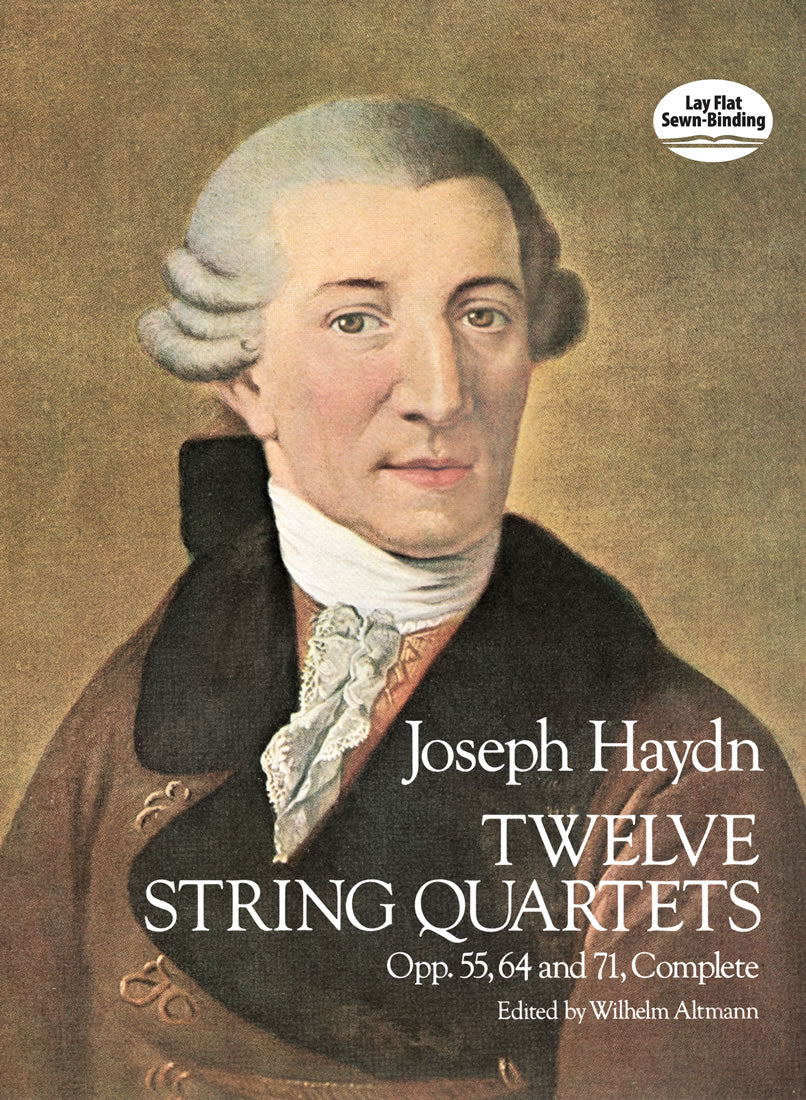
Dover Publications - 486
Haydn 12 String Quartets, Opp. 55, 64 and 71 Complete
Composer: Joseph Haydn
Publisher: Dover Publications
Format: Full Score
Binding: Paperback
Dimensions: 8.38 in x 11.25 in
Pages: 288
Haydn 12 String Quartets, Opp. 55, 64 and 71 Complete
Juilliard Store
144 West 66th Street
New York NY 10023
United States
Choose options
Haydn 12 String Quartets, Opp. 55, 64 and 71 Complete
Juilliard Store
144 West 66th Street
New York NY 10023
United States
Haydn 12 String Quartets, Opp. 55, 64 and 71 Complete
Juilliard Store
144 West 66th Street
New York NY 10023
United States
"It was from Haydn that I first learned the true way to compose quartets." — Mozart.
Twelve String Quartets marks the second volume in a projected monumental undertaking — the complete Haydn string quartets. Players and students, music historians, and Haydn lovers will have inexpensive access to a uniform, strongly bound, and clearly printed modern edition of Haydn's finest pieces in complete score.
Musicians, music students, and music publishers have a difficult time keeping up with Haydn, whose ceaseless production of original, first-rate work was legendary. He essayed most of the recognized genres, conferring upon several a legacy of expanded possibilities and clearly defined, characteristic form. Among these may be mentioned the symphony, the sonata, and perhaps most notably, the quartet.
In a period of 50 years, Haydn (1732–1809) composed over 80 string quartets. Scholars are still debating questions of attribution and even completeness (unknown works by Haydn still turn up), and music lovers have had to make do with scattered, out-of-date, out-of- print editions of a few of the more familiar quartets.
Otto Jahn wrote: "It is not often that a composer hits so exactly upon the form suited to his compositions; the quartet was Haydn's natural mode of expressing his feelings." Haydn's affinity to the quartet began with his earliest works, when he perhaps more than anyone established the four-movement structure of chamber music. In common with truly great and complete artists, who surpass early innovation to achieve their greatest work at the end, Haydn's later quartets are his best.
This volume contains the full scores of:
Op. 55, Nos. 1–3 (including "Razor") — dedicated to Joh. Tost, ca. 1788
Op. 65, Nos. 1–6 (including "The Lark" or "Hornpipe") — dedicated to Joh. Tost, 1790 or 1792
Op. 71, Nos. 1–3 — dedicated to Count Appony, 1793
Large readable noteheads, ample margins for fingerings, etc., opaque paper, and permanent binding make this a fundamental addition to music libraries and musicians' repertories: a book for all who pay tribute to Haydn and who agree with Grove's Dictionary: "The quartet he … brought to perfection."
